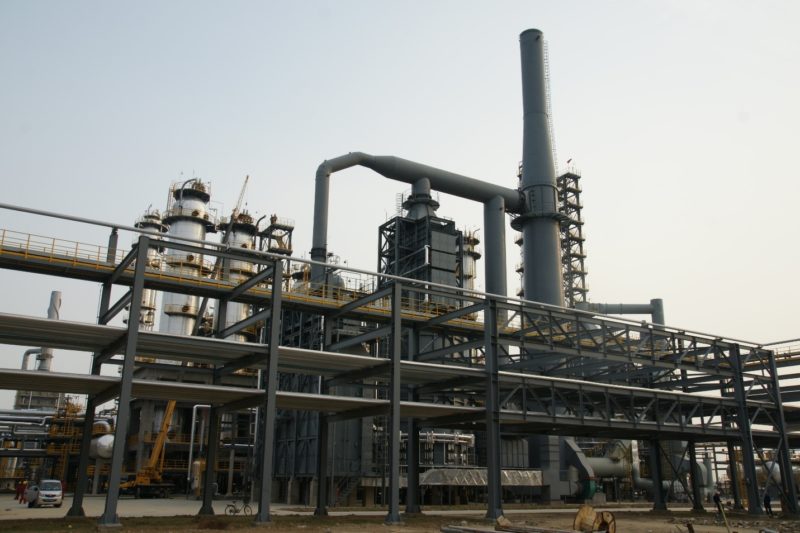
20,000 bpd SELEX-Asp unit which was commissioned in 2015.
CALGARY, Alberta, March 26, 2018 – A technology developed with Canadian expertise and commercialized overseas is being touted as the solution to partial upgrading.
In 1992, Dr. Keng Chung set out to answer the question, ‘what exactly is in Canadian bitumen that makes it so difficult to handle and process?’ The journey to answer this question led him to start his own company, Well Resources Inc. (“Well”) and partner with the China University of Petroleum.
“We didn’t initially go out seeking to develop technology,” Chung said. “But after spending years carefully examining and understanding the sciences behind heavy crudes, we developed a process that efficiently removes the most problematic components.”
Those problematic components are called asphaltenes. Asphaltenes are the highest carbon intensity molecule class found in oil, and they contribute to the undesirable flow properties and processing difficulty of heavy crudes. By removing them, numerous issues facing the Canadian oil industry are solved.
First, asphaltene removal greatly reduces the density and viscosity of heavy crude, which reduces dependency on diluent and frees-up transport capacity in already existing pipeline infrastructure.
Second, a deasphalted oil product can be sold at a premium compared to asphaltene-containing crudes. Asphaltene-containing crudes require specialized and expensive process equipment on the refiner’s end, and are sold at a discount to offset those increased processing costs.
And third, after removing asphaltenes, the Canadian crude market share is significantly expanded as producers are no longer constrained in selling to refineries equipped with cokers.
Technology Highlight
Well’s patented technology is called Selective Extraction of Asphaltenes (“SELEX-Asp”), which it licenses worldwide.
SELEX-Asp is a low cost, low complexity, and environmentally friendly solvent-based process. By manipulating solvent power under moderate operating conditions, the technology is uniquely capable of cleanly rejecting asphaltenes from heavy petroleum fractions in the form of solid granules.
By doing so, it maximizes the yield and economics of producing deasphalted oil, which can then be sent to conventional refining processes to produce a full slate of clean transportation fuels, including low sulfur IMO fuel.
The rejected asphaltenes can either be used as feedstock for making carbon products or disposed of in an environmentally friendly manner without the need for secondary treatment, unlike conventional technologies.
Commercialization
Over a decade ago, Well approached the Alberta business community and pitched the concept of the first SELEX-Asp demonstration unit. Citing risk aversion, Well was unsuccessful in finding a Canadian partner and instead turned its focus to China, where PetroChina commissioned the first 500 bbl/d unit in 2009 at its Panjin refinery.
Since then, four more SELEX-Asp units have been built in Asia for a combined processing capacity of 36,500 bbl/d, with the largest commissioned unit having a capacity of 20,000 bbl/d.
Dr. Keng Chung now serves as a refining advisor to the Chinese central government and a research program advisor at the Chinese Academy of Sciences. His son, Warren Chung, has taken over Well’s operations.
“We are far beyond the proof of concept and piloting stages,” said Warren Chung.
When pressed about commercializing the technology in Canada sooner, Chung further explained that from 2010 to 2014, Well had to compete with high commodity prices.
“When Canadian companies were netting $30-$40/bbl on upstream oil production, it became difficult for them to justify capital investments on downstream projects that could net $10-$15/bbl,” he said. “But in China, $10-$15/bbl on the processing side is very attractive.”
With the recent collapse in commodity prices, the conversation in Alberta has refocused on partial upgrading as a way to diversify the province’s energy resources and overcome pipeline capacity constraints.
“We are glad that Albertans have turned their focus to adopting innovative solutions to our energy problems,” said Chung. “SELEX-Asp is a common sense and practical solution to the partial upgrading conversation, and it is commercially proven.”
About Well
Well is a privately held Canadian technology company with local offices in Calgary and Edmonton. Well’s principal business consists of the development, advancement, and commercialization of technologies that promote effective resource utilization in an environmentally friendly manner.
For more information, contact info@wellresources.ca or visit www.wellresources.ca.